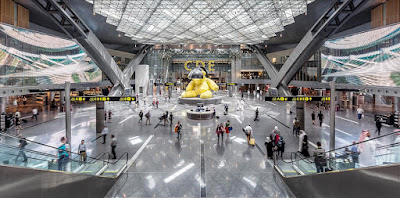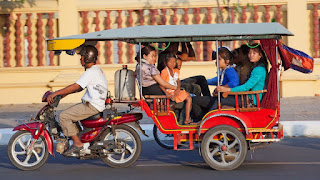1. Take off
The departure from Nice Airport was indeed ahead of schedule, but since we were well into the afternoon, and headed eastward, the alpine mountain range to the far north soon began to recede into a crimson haze, while the sun sank deeper into the mass of clouds hovering over the Apennines. In the last embers of daylight I could discern the vast expanses of snow capped mountains, and the sparsely inhabited valleys of the Balkan peninsula.
Guided by the night lights from human settlements I could still see the Bay of Adana, at the north-eastern extremity of the Mediterranean, disappear abaft the beam on starboard side, indicating that the aircraft wisely avoided to enter Syrian airspace. What I didn’t know then, was that Qatar Airlines — because of some squabble in the petro-dollar-trillionaire club to which the country’s government belongs — has been banned from Iraqi airspace as well, and had to fly across all of Turkey, and then into Iran, before it could set course, southbound, for Doha in the Persian Gulf. We arrived there in the middle of the night, after having passed over surprisingly large Iranian cities, alongside the intensely illuminated mega structures of Bahrain, and the ominous looking flames crowning its oil fields.
 |
| Doha Airport |
Doha is the capital of Qatar, a country and peninsula smaller than Northern Ireland. To make up for its lack of land mass it has quite literally taken to the skies. The airport is enormous, completely at odds with what one would expect to be the needs for air travel among the country’s inhabitants. But that’s the whole point. There is only a fraction of the passengers on the Qatar Airlines’ extensive route network who are actually Qatar. Crews, in the air and on land, come from all over the world, and so do the passengers to whom they cater.
I believe the transit bus spent at least twenty minutes constantly driving along airport corridors that were wide as six lane highways, except there was no traffic on them, in order to arrive at the point of disembarkation. The terminal, the size of a town rather than that of a super-sized shopping mall, had all conveniences including an abundance of restaurants, shops, and attractive duty free stores. With a layover of only two and a half hours, I opted for a quick visit to Burger King and then to the Duty Free to buy some whisky. I also seized the occasion to draw some American dollars from the ATM-Machine, knowing they would come in more than handy at the Phnom Penh Airport, where the payment to obtain a visa would be exacted in dollars, and nothing else.
 |
| Saigon from the air |
Up and into the skies. The plane wasn’t quite full this time either, so I managed once again to tuck myself in at the far back corner of the cabin, with two seats and an array of pillows to myself. At this point I was quite exhausted, and only vaguely remember waking up somewhere above Karachi, where we experienced some turbulence, and then, again, way past the northern part of the entire Indian sub-continent, as we flew above the pristine archipelago of Myanmar, glistening in the morning sun. I saw nothing of Thailand and was called back to reality by the British Captain announcing our descent over Cambodian territory into the Saigon Airport.
The area around the Saigon airport, as seen from above, has a couple of unmistakeable characteristics. One is that its highly irregular buildings, streets and alleys are tightly intertwined in a suburban system that defies conventional definition. The second is that all roofs here are green. I’m sure there must be other salient characteristics as well, but with only an hour to spare in Vietnam, during a so-called technical landing, which in reality was tantamount to the evacuation of all passengers, save for the twenty or so brave souls remaining in the cabin, patiently waiting for the aircraft to eventually hit ground in Cambodia.
Approaching Phnom Penh —a skip and a jump from Saigon in the aeronautic context — I could see that it too had a couple of unmistakeable characteristics. One is the number of colourful Buddhist pagodas dotting the cityscape with golden spires. The other that nearly all its roofs are made from red brick.
 |
| Cambodian tuc-tuc |
There we were. The transition from a Provence, still not able to make up its mind about going into spring or abide by winter, to the eternal summer of the tropics, was complete. I got my visa and found myself on the pavement in front of a terminal building that seemed a doll’s house compared to the one I had just left in Doha. Taxi rides to somewhere in the city centre were offered at five-teen dollars. Knowing this simply must be over-priced, I managed to talk a tuc-tuc driver into taking me to my hotel for five.
In principle that sounded ideal. Good price combined with a sight-seeing of Phnom Penh from a half-open carriage. The only small problem was, that the driver turned out to have no clue whatsoever as to the location of the Independence Monument — truly a landmark edifice on Sihanouk Boulevard, not the most inconspicuous street in the city — in the vicinity of the hotel. I of course also had the exact address of the hotel; as if that would help: I don’t think I exaggerate if I claim we spent the next one and a half hours looking for it, a time during which I got to see more of Phnom Penh than I had bargained for. One of the reasons for this is a peculiarity of the friendly and accommodating Cambodian character. You see, a typical Cambodian will point you in the wrong direction rather than owe you an answer. And even if he does indeed point you in the general direction of where you want to go, it will be accompanied by an arm movement covering about 90 degrees of a circle, substantially increasing the risk of getting lost in direct proportion to the distance travelled.
My driver, whom I repeatedly urged to get in renewed contact with his compatriots, in the vain hope of bringing us nearer to my goal, didn’t seem to be able to make heads or tails out of the instructions he got from apparently reliable sources. We kept swirling about in the dense traffic, like the debris in Edgar Poe’s story on the Malstroem, off the Norwegian coast, or like the Flying Dutchman, for ever condemned to vagabond the high seas, unable to reach a port.
At one point the driver turned to me and signalled with his fingers that he now felt eight dollars, instead of the agreed five, would be a more appropriate sum of money in exchange for taking me to the hotel, which he couldn’t find in the first place. I had to explain to him, that I was gladly paying for his services, but that this didn’t mean I would also pay for his mistakes and the delay he caused me.
 |
| Hotel Monsoon |
Anyways, as if out of nowhere, and after I had asked him numerous times to stop the vehicle so I could pay him off and get another transport — a favour he promptly refused to grant me — we stopped for a last desperate interrogation of some gentlemen calmly occupying a street corner. Lo and behold! It was right there, on the opposite side of the street: The Hotel Monsoon.
I was relieved and honestly quite happy to give the driver the eight dollars he didn’t deserve, because I had indeed reached my first port of call. Our ways then parted as I entered the hotel lobby and was warmly greeted by the local staff: courteous, helpful and ready to get out of their way in order to get me whatever I fancied, in a self-evident and unpretentious manner that immediately struck me as both typically and pleasantly non-Western. I had, some almost five-teen years since my latest trip to South-East Asia, finally alighted — in Cambodia.
To be continued...



